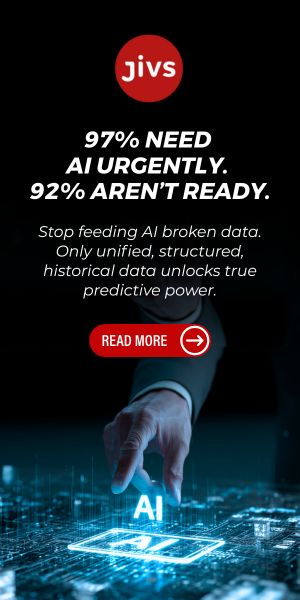QAD Redzone, a connected workforce solution for the manufacturing sector, announced in November 2024 the launch of Champion AI, a suite of AI-driven capabilities designed to empower the frontlines with predictions, recommendations, proactive problem solving, and enhanced productivity. Champion AI goes beyond traditional AI applications by solving specific problems on the plant floor in a new way.
QAD Redzone has long included AI to overcome language barriers, transcribe and translate video content, and streamline support processes—all with a focus on tangible results and critical information that frontline workers need to excel. QAD acquired Redzone in 2023 to strengthen its vision of the Adaptive Enterprise. Founded in 2013, Redzone has focused on empowering frontline teams through technology and skills development to enhance productivity and achieve company goals. Among its capabilities, Redzone’s platform offers real-time, social mobile communication tools that connect and unify team members across departments, fostering collaboration and a unified purpose.
By integrating Redzone’s solutions, manufacturers can transform productivity and frontline engagement, addressing challenges such as rising input costs and labor shortages. With customers of all sizes, Redzone is helping more than 1,300 plants worldwide achieve productivity gains in just 90 days.
Champion AI, the company’s next generation of AI, provides predictive and prescriptive analytics through Generative AI to address daily challenges in manufacturing such as detecting plant-wide outliers, delivering daily operational summaries, predicting run durations and identifying potential run problems before they happen. The pragmatic AI solution equips workers with the tools to anticipate issues, optimize changeovers, and analyze performance data — setting new standards for engagement and productivity. Redzone’s automated productivity data collection provides a feedback loop so that Champion AI knows which recommendations drive the best outcome.
“Champion AI represents our commitment to practical AI solutions that assist workers in achieving higher productivity, not by overwhelming or replacing them with technology but by acting as an accessible, intelligent assistant,” said Ron Davis, senior vice president of product engineering at QAD Redzone. “This is the AI champion that factory teams have been waiting for because it provides meaningful insights to address real issues they are facing on the factory floor.”
What this means for ERP insiders
No enterprise system is an island. It’s important for manufacturing executives to understand where and how to integrate solutions like Champion AI within the rest of their enterprise technology stack. Here are a few adjacent systems manufacturing leaders should include in their system and process integration strategy for solutions like Champion AI:
- Enterprise Resource Planning (ERP) Systems: Align production schedules, inventory levels, and financial data between Champion AI and ERP systems to ensure consistency and real-time visibility. Automate workflows such as order processing and resource allocation by integrating AI-driven insights into ERP processes.
- Manufacturing Execution Systems (MES): Feed real-time production data from MES into Champion AI for enhanced analytics and predictive maintenance. Utilize AI insights to detect anomalies and enforce quality standards during manufacturing processes.
- Supply Chain Management (SCM) Systems: Integrate AI-driven demand predictions to optimize supply chain planning and inventory management. Leverage AI to assess and mitigate risks associated with suppliers, enhancing supply chain resilience.
- Human Capital Management (HCM) Systems: Align AI-driven productivity insights with HCM data to optimize staffing and training programs. Use AI analytics to evaluate employee performance and identify areas for development.
- Internet of Things (IoT) Platforms: Integrate IoT sensor data with Champion AI to enable predictive maintenance and real-time equipment monitoring. Utilize AI to analyze IoT data for optimizing manufacturing processes and reducing downtime.
- Customer Relationship Management (CRM) Systems: Incorporate AI analytics to understand customer preferences and improve product offerings. Enhance order processing and fulfillment by integrating AI-driven demand forecasts with CRM data.
- Business Intelligence (BI) Tools: Combine AI insights with BI tools to generate comprehensive reports and dashboards for informed decision-making. Use AI to identify patterns and trends in operational data, supporting strategic planning.
Investigate the experiences of existing QAD Redzone customers. For companies that are not already QAD customers, it would make sense to get a first-hand feel for its track record. For instance, talk to Beckett Air, Jel Sert, and Pharmacal. These manufacturers utilized the integration of QAD ERP with QAD Redzone Connected Workforce to address challenges such as labor shortages and manual processes. The integration resulted in significant improvements in Overall Equipment Effectiveness (OEE) and productivity, demonstrating the effectiveness of QAD’s Industrial Transformation Platform. Or on the supply chain side, speak with Future Electronics, a global electronic components distributor, which integrated QAD’s Global Trade and Transportation Execution (GTTE) solution to streamline its order processing and international delivery systems. This integration enabled the company to process approximately 20,000 pieces daily, enhancing supply chain velocity and customer satisfaction. And another source could be Saft, a global provider of high-technology batteries, which implemented QAD’s Enterprise Quality Management System (EQMS) to improve production tracking, maintenance scheduling, and audit processes. This implementation resulted in enhanced compliance and operational efficiency.
Work with QAD Redzone team to quantify success criteria. The KPIs will vary by company, but generally speaking, you should look for improvements from Champion AI in the following five areas:
- Productivity Enhancement:
- Increased Throughput: AI-driven insights enable optimization of production schedules and processes, leading to higher output.
- Reduced Downtime: Predictive maintenance capabilities foresee equipment failures, minimizing unplanned downtime.
- Quality Improvement:
- Defect Reduction: Real-time monitoring and anomaly detection decrease the rate of defective products.
- Consistency: AI ensures adherence to quality standards, maintaining product uniformity.
- Cost Savings:
- Lower Maintenance Expenses: Predictive maintenance reduces the need for emergency repairs.
- Waste Minimization: Process optimization leads to less material waste.
- Operational Efficiency:
- Faster Decision-Making: AI provides actionable insights, expediting response times.
- Resource Optimization: Efficient allocation of labor and materials enhances overall efficiency.
- Employee Engagement:
- Empowerment: Frontline workers gain access to AI tools, boosting engagement and morale.
- Skill Development: Interaction with advanced technologies fosters continuous learning.






